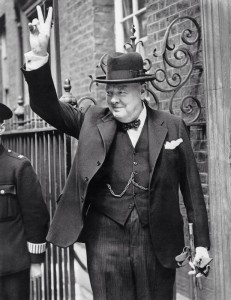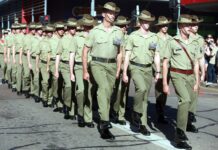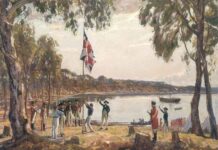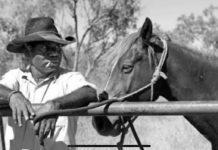Originally published September 20, 2015.
Sir Winston Churchill has been several times voted the greatest Briton of all time in nation-wide polls. Knighted in 1953 and awarded a Nobel Prize for literature the same year, the some time journalist and war correspondent, solider, first Sea Lord, and politician, did and achieved a lot in his long life. The abiding memories and legacy of Churchill are, however, his aphorisms and his speeches, which continue to contribute to the lexicon of the English language to the present day, many of them remaining instantly recognisable more than fifty years after his death. The occasion of Churchill’s ascendancy as Prime Minister, in 1940, together with the urgency of the hour in the context of the Second World War, was the catalyst for most of his greatest and most famous oratory. Within three days of receiving the royal consent to form his wartime government, Sir Winston rose in the House of Commons to deliver his manifesto, offering nothing but “many months of struggle and suffering” and “blood, toil, tears and sweat,” his one policy being to “wage war against a monstrous tyranny,” and his sole aim “victory.”
The “blood, toil, tears and sweat” speech had been delivered in May 1940, with the German army rampaging through Norway, and the British people and political class rapidly losing faith in the policy of appeasement pursued by Neville Chamberlain. By mid-June, just a few weeks later, France had fallen, and Sir Winston again rose in the Commons to deliver a further important speech. There was, now, a very real prospect that Hitler would attempt an invasion of Britain. Hence, Churchill told the Commons, “the battle of France is over. I expect that the battle of Britain is about to begin.” Upon that battle, Churchill told the listening Commons, and, through the medium of the radio, the British people and the listening world, depended not only the survival of Britain and its traditions, but the very “survival of Christian civilisation.” The magnificent prescience of the oratory continues to echo down through the years to the present day.
“What General Weygand has called the Battle of France is over. The battle of Britain is about to begin. Upon this battle depends the survival of Christian civilisation. Upon it depends our own British life and the long continuity of our institutions and our Empire. The whole fury and might of the enemy must very soon be turned on us. Hitler knows that he will have to break us in this island or lose the war. If we can stand up to him, all Europe may be free and the life of the world may move forward into broad, sunlit uplands. But if we fail, then the whole world, including the United States, including all that we have known and cared for, will sink into the abyss of a new Dark Age made more sinister, and perhaps more protracted, by the lights of a perverted science. Let us therefore brace ourselves to our duties, and so bear ourselves that, if the British Empire and its Commonwealth last for a thousand years, men will still say, ‘This was their finest hour.’”
As he had anticipated, the Battle of Britain commenced soon after Churchill spoke these words. In an attempt to establish air superiority over the British Isles as a precursor to an amphibious invasion (code named operation Sealion), the German Luftwaffe flew an almost daily regime of bombing raids and sorties over Britain, an action that extended over the summer and autumn months of 1940. Although greatly outnumbered, the Royal Air Force, aided by the Canadians, and those who had managed to escape from just about every country on the continent now under Nazi occupation, ultimately prevailed, and operation Sealion was postponed. In August 1940, with the battle in the air still raging, Churchill had made perhaps the most famous speech of all, forever defining the young pilots who were continuing to defend Britain at great cost even as he spoke as “the few” to whom “the many” owed so much.
“The gratitude of every home in our Island, in our Empire, and indeed throughout the world, except in the abodes of the guilty, goes out to the British airmen who, undaunted by odds, unwearied in their constant challenge and mortal danger, are turning the tide of the World War by their prowess and by their devotion. Never in the field of human conflict was so much owed by so many to so few. All hearts go out to the fighter pilots, whose brilliant actions we see with our own eyes day after day, but we must never forget that all the time, night after night, month after month, our bomber squadrons travel far into Germany, find their targets in the darkness by the highest navigational skill, aim their attacks, often under the heaviest fire, often with serious loss, with deliberate, careful discrimination, and inflict shattering blows upon the whole of the technical and war-making structure of the Nazi power. On no part of the Royal Air Force does the weight of the war fall more heavily than on the daylight bombers who will play an invaluable part in the case of invasion and whose unflinching zeal it has been necessary in the meanwhile on numerous occasions to restrain… “
The British victory in the Battle of Britain was the first major military defeat inflicted on the then dominant German war machine. It not only prevented the planned invasion of Britain, but was an incalculable boost to the morale of the allied forces who had suffered, by then, a succession of defeats. The battle was also the catalyst for a shift in public and political opinion in the then neutral United States, which had feared that Britain too might fall to Hitler, but now realised the British would stand alone against Nazi-occupied Europe and would need all the help they could be afforded. The calls for American support and intervention increased greatly from this point. In terms of the battle itself, a turning point came with a shift in the intensity of the Luftwaffe bombing from 15 September 1940, a date which Churchill eventually designated as the moment of victory and which came, after the war, to be Battle of Britain Day. The 75th anniversary of that day, and of that victory, fell during the course of this past week, providing a fitting occasion on which to remember and to honour “the few” who delivered victory in the air, and the one man who, through the strength and resolve of his character and his oratory, ultimately delivered victory in, not only the battle, but the war.











